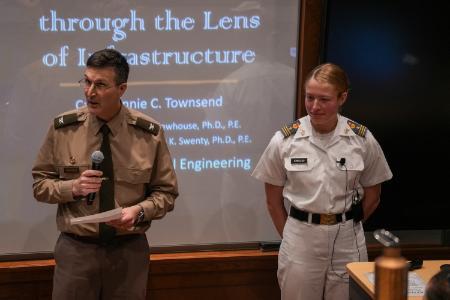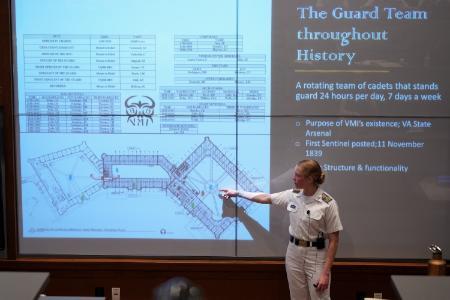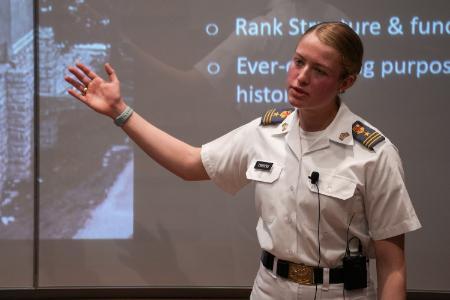Honors Week: Barracks Security At VMI

LEXINGTON, Va. March 25, 2024 — Serving as cadet operations sergeant for Band Company her 2nd Class year, Annie Townsend ’24 was able to set up a cadet guard team, which would perform the security for barracks at Virginia Military Institute. The team would oversee locking gates, coordination during emergency situations, enforcing uniform or disciplinary standards within the Corps, and posting members of the guard team for the security of the Corps of Cadets.
As her experience grew in that capacity, it piqued her interest in the security of barracks. Specifically, the interaction of infrastructure with the implementation of security. 
“In conjunction with my interest in architecture — and particularly historic architecture — I developed my research to include aspects of security engineering, structural engineering, architecture, and the historical development of security at VMI,” she said.
Townsend, a civil and environmental engineering major, started her honors thesis midway through her 2nd Class year.
"I started by brainstorming, speaking with professors and finding faculty advisors, and writing a prospectus (research proposal),” she said.
Col. Chuck Newhouse, head of the Department of Civil and Environmental Engineering, served as Townsend’s advisor. He said when she approached him with the idea of combining her interests in engineering with the role of VMI’s guard team to take a critical look at the security at VMI, he was a little hesitant.
"Initially, I was reluctant to recommend that she pursue this because it is a controversial topic,” he said. “It is controversial because not everyone agrees on the best ways to provide security. Also, VMI doesn’t fall into one clearly defined category. It is, on the one hand a public college, and on the other hand an institution with a strong military presence. Should security follow requirements provided for colleges, or for military bases? It is not an easy question.” 
She presented her thesis “A Security Analysis of the Virginia Military Institute’s Barracks through the Lens of Infrastructure” during VMI’s Honors Week.
Initially, her research had gone through several phases. She said she hoped to study the blast resistance of barracks based on the structural design, in the context of security and antiterrorism security.
“After realizing that I’d like to pursue architecture after graduation, I wanted to mold my topic to account for the architectural aspects of barracks as well,” she said. “I ultimately ended up blending architecture and structural/security engineering together to develop my final topic, a security analysis of barracks through the lens of infrastructure.”
Her research aimed to identify whether modern-day security that governs cadet life in barracks is sufficient.
The focus of the research was on four topics:
- Military influences on VMI’s security
- 9/11 and its impacts on institutions of higher learning
- How historical developments connect to security upgrades
- How the research relates to barracks infrastructure, architecture, and structural engineering
“VMI’s barracks is the center of cadet life — it’s where we train, sleep, assemble for formations and parade, and get to know the brother rats that will be there for us throughout the rest of our lives,” Townsend said. “It’s where our cadetships begin on Matriculation Day, the center of our cadet organizations and activities throughout our four years, and where our cadetships end on graduation day.
“Ultimately, it houses VMI’s most valuable asset — the Corps of Cadets,” Townsend continued. “My research analyzes how the structure of barracks itself, and supporting human elements, reinforce and affect the security of the Corps of Cadets.”
A survey was conducted as part of Townsend’s research. The goal of the survey was to identify the Corps’ opinion on existing security infrastructure and the relevance of the guard team in security of barracks. The survey was voluntarily completed by 177 cadets, or 10.4% of the Corps, her research said.
The research showed that VMI’s approach to security is currently acceptable, but there’s significant room for improvement. Townsend says about 76% of the Corps felt entirely safe living in barracks, while about 14% said they feel neither safe nor unsafe living in barracks. But, nearly 10% of the Corp — 35% of that section were female cadets — did not feel entirely safe. 
There are plans in place to ensure more security measures are met. According to the VMI Post Facilities Master Plan, roads, foot paths, parking areas, lighting, emergency lights and phones, along with signage are to be considered to enhance security. New security technologies are to be adopted with the attention to historical facilities, the plan said.
"As time progresses, change will remain the only constant in VMI’s approach to security — just as it has been in the past,” Townsend said in her thesis. “It is important to approach the security of VMI in the broader context; considering that it is neither a traditional college campus or a military installation, the approach to security is, and will always be, complex.”
Townsend said her research allowed her to develop insight into VMI’s unique history of security development, along with the culture of the Corps of Cadets that facilitates the security of barracks.
Her hope after graduation in May is to pursue a master’s degree in architecture, and study historic architecture and adaptive reuse. She's also interested in the impact of architecture on the security of facilities and structures.
Laura Peters Shapiro
Photos by Lexie West
Communications & Marketing
VIRGINIA MILITARY INSTITUTE
.svg)
.png)